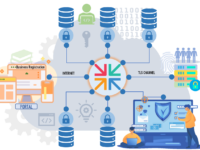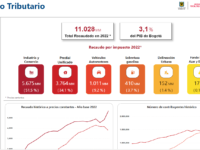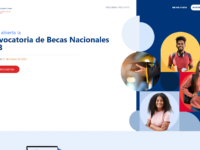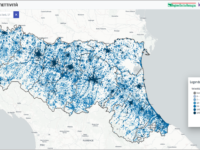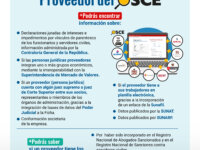The inability to interoperate between different information technology (IT) systems has urged the Cambodian government to develop Cambodia Data eXchange (CamDX). CamDX is a unified yet decentralized data exchange layer between IT systems which offers a secure way to provide and consume services, ensures confidentiality, integrity and interoperability between many different data exchange parties. Whether you are a service consumer or provider, you benefit from CamDX in one way or another.
Innovation Tag: Transparency
FiscalData is an innovative tool created for the analysis of Bogota, Colombia's fiscal situation. It promotes transparency around local public sector finances. FiscalData seeks to benefit the citizens of Bogotá by serving as a mechanism for participation on fiscal issues between civil society and the public and private sectors.
The Information System for Monitoring the State Anti-Corruption Program (country's Integrity Program) was developed to effectively address the challenge of monitoring the Integrity Program. This innovative solution simplifies and streamlines the processes related to the Program's implementation, ultimately leading to more effective governance. Primarily, considering the OECD's Recommendations on Public Integrity, which highlight that traditional approaches relying on strict rules and law…
The Unique Scholarship Portal (Portal Único de Becas “Beca tu Futuro”) is a web platform that aims to concentrate all scholarship opportunities in a single portal. In this way, it documents and manages everything from the publication of the call for applications to the awarding of scholarships. The portal benefits all the citizens of the Dominican Republic who wish to apply for a scholarship. Moreover, the portal serves as a management tool for the scholarships' evaluators and the…
Emilia-Romagna’s Digital Agenda led a significant innovation process for public administration decision-making. The process resulted in a co-design phase with local administrations to structure and publish online the first geo-referenced regional Observatory on ultra-broadband connectivity in Italy. Multi-stakeholder participation made it possible to identify and highlight the various strengths and weaknesses of the tool, enabling its optimisation.
The scattered information of supplier's background makes it difficult to identify suitable suppliers for public procurement and affects goods, services and works delivery. The "Single Supplier Search" through single supplier sheet integrates and validates, through Big Data, providers' qualifiable aspects to be a supplier. It promotes transparency, citizen oversight and provides reliable and timely information to buyers, suppliers and citizens.
Case Study
The multi-country PALOP-TL eBudget CSO Digital Platform for transparency & accountability
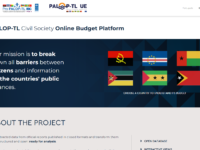
Civil Society Organisations and Ministries of Finances from the PALOP-TL countries (Angola, Cabo Verde, Guinea Bissau, Mozambique, São Tomé e Príncipe, Timor-Leste) developed the 1st ever transnational digital network for citizens’ fiscal literacy and participation in budget cycles. The Digital Platform uses data transparency tools with pictographic representation to simplify complex budgetary documents for the wider public, increasing transparency and accountability in public finance…
The Buenos Aires City Government launched Climate Action, an open data platform that brings together energy efficiency, sustainability and waste management policies to combat climate change in the city. The platform is based on transparency, co-creation, collaboration, citizen participation, accountability and innovation. BA Climate Action was co-created with civil society organizations, environmental experts and citizens.
Better Insights into Collective Climate Actions: The currently fragmented, insufficient and incompatible sources building the climate data framework remain a critical threat to a successful outcome of the 2023 Global Stocktake for the Paris Agreement. While we observe an increasing amount of participation, effective ways of connecting, visualizing and analysing actors patterns & impact, within the overall climate initiatives, remain limited.
„Gemeinsam Digital: Berlin“(Together Digital: Berlin) combines the digital and smart city strategies. We define smart as solving future challenges in creative, open, experimental and participatory ways. This strategy helps to establish new work approaches, agile methods, competence building, and a systematic knowledge transfer between the administration and its inhabitants. By aligning technologies, methods, and cultural processes, it supports existing strategies to reach their respective…

